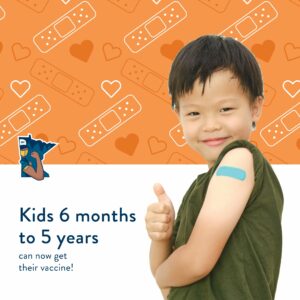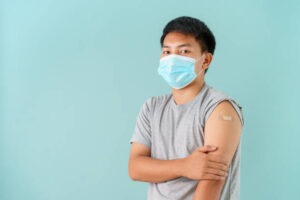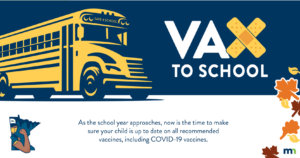Developed by Asian Media Access, Chinese American Chamber of Commerce – MN, and Spitfire
COVID has changed the lives of many communities. But the LGBTQIA+ community has been left out of many conversations about public health and COVID. Most states, including Minnesota, do not report on COVID statistics for the LGBTQIA+ community.[1] This makes it hard for public health experts to understand the community’s needs and for advocates to get resources. The data gap makes it even more important for public health and advocates to listen directly to the LGBTQIA+ community. June was Pride Month, a season where the LGTBQIA+ community is celebrated with parades and brand-name ad campaigns. But the LGBTQIA+ community deserves to be seen and supported year-round, especially when it comes to health care and COVID.
Seeing and supporting the LGBTQIA+ community
It is clear that LGBTQIA+ youth have struggled during COVID. LGBTQIA+ people have had higher rates of poverty, houselessness, unemployment, and mental health issues since COVID started.[2] In the LGBTQIA+ community, 74% say that worry and stress about COVID have been bad for their mental health, compared to 49% of people who do not identify as LGBTQIA+.
Tezzaree El-Amin Champion, the executive director of Encouraging Leaders, says COVID made feelings of isolation worse: “The pandemic came on top of the stresses that we deal with on a daily basis like family not being accepting of your sexuality.”
Health care offices should be a safe place where everyone is welcome. But some insurance companies and doctors do not respect LGTBQIA+ people or offer them care. Many LGTBQIA+ youth have had bad health care visits that stop them from continuing to seek health services.
On top of that, difficulties created by COVID – like losing income or housing – also make it harder to get health insurance and trusted, current information about COVID and vaccines.
Finding care in community
Everyone deserves access to quality medical care that respects their gender and sexual identity. And vaccines are an important part of health care. As public health programs work to fight COVID, it is also important to build systems that improve long-term access to health care.
Minnesota organizations like Encouraging Leaders are working toward this goal. They are creating networks of healthcare professionals who provide care for LGTBQIA+ individuals.
Champion explains, “A lot of people are just afraid to go to the hospital or go to a doctor. So, we try our best to create a safe place and connect people to doctors that we consider LGBTQIA+ friendly. We try to customize and personalize the type of services and resources for these individuals.”
Tezzaree, or “Tezzy” as he is known by the youths he mentors, knows that going to a healthcare center can be scary. That is why he is bringing conversations about health to young people. Tezzy and his staff meet young people where they are – in their homes or his office in Minneapolis where they hold information sessions and clinics.
Encouraging Leaders’ work goes beyond vaccines and medical care. They also offer help with mental health, financial literacy, and employment because these also improve wellness. And community is at the center of all of their work. COVID was isolating. To overcome the pandemic, communities need safety measures like masks and vaccines, but individuals also need to reconnect with support networks. Tezzy and his staff have worked hard to create a “chosen family” by building relationships with young people and trusted doctors. Creating a safe space and consistent medical and social support helps young people make decisions about vaccines when they are ready. Organizations like Encouraging Leaders and Project HEALINGS are here to continue the conversation with the LGBTQIA+ community, during COVID and beyond.
CHANGING TO FIGHT THE VIRUS
All communities deserve clear and trustworthy information about COVID and how to stay safe.
The COVID vaccines are saving lives. They are especially good at preventing severe sickness for people with conditions like diabetes, HIV, asthma, and heart disease. These conditions make it harder to fight off COVID. Vaccines give the body the strength to fight the virus. Vaccines can also help people stay out of the hospital and prevent death.
Understanding safety facts like this can be hard. New information is released every week. It is even harder for unhoused populations and people with limited English to get new information. By the time updates are translated and shared, the information has already changed.
But new information is important. It shows that public health experts are being honest and their advice is effective. Champion shares, “I’m constantly talking with my friends about COVID and what kind of safety measures we are taking. Although guidelines change often, I try to stay up to date because that is the best way to protect myself.”
There have been many “variants” or forms of COVID (like Delta and Omicron) because viruses change over time. So far, each new form of COVID spreads more easily but may cause less serious sickness. This is why information about infections changes.
To keep up with COVID, people have to change too. You would not want to find your way around a new neighborhood with a 50-year-old map. The streets may stay the same, but the details have changed. There are new shops and restaurants to find.
Old information can still inform our decisions, but the newest information will help us find the fastest and safest way out of COVID. The good news is that you do not have to learn this information alone.
[1] Kramer, J. (2021, May 7). In Covid Vaccine Data, L.G.B.T.Q. People Fear Invisibility. The New York Times. https://www.nytimes.com/2021/05/07/health/coronavirus-lgbtq.html
[2] COVID-19 and the LGBTQ Community: Vaccinations and the Economic Toll of the Pandemic. (2021). Human Rights Campaign Foundation, PSB Insights. https://hrc-prod-requests.s3-us-west-2.amazonaws.com/files/documents/COVID-Vaccines-Brief-030821.pdf
English Version Chinese Version Hindi Version Hmong Version Khmer Version Spanish Version Thai Version Vietnamese Version


